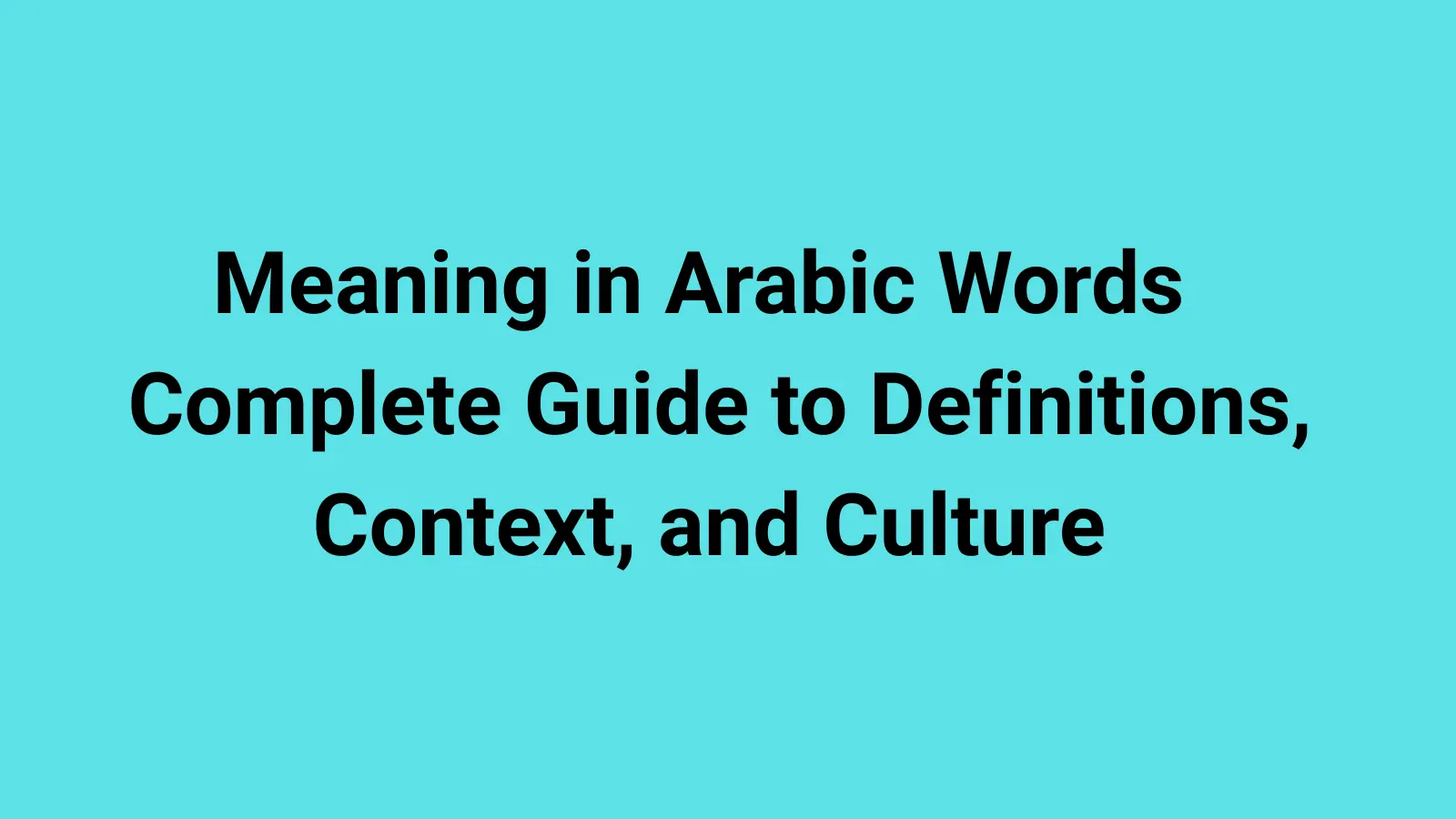The Arabic language is one of the most poetic, expressive, and historically rich languages in the world.
When we talk about “meaning in Arabic words”, we’re exploring more than simple dictionary definitions — we’re entering a world where each word carries deep cultural, historical, and emotional layers.
Arabic is spoken by more than 400 million people across the Middle East, North Africa, and beyond, and its vocabulary blends modern expressions, classical origins, and borrowed influences.
In this guide, we’ll break down meaning in Arabic words from every angle: how meanings shift with context, why some words have no exact English equivalent, the importance of root letters, and how tone and pronunciation can change meaning entirely.
We’ll also give real-life examples, usage tips, and even “untranslatable” gems that make Arabic so uniquely beautiful.
What Does “Meaning in Arabic Words” Actually Mean?
When someone asks for the meaning in Arabic words, they might be looking for:
- The Arabic translation of an English word.
- The definition of an Arabic word in English.
- The nuanced cultural context behind a word.
- The emotional or poetic essence a word carries.
Arabic isn’t just a direct swap for English words — a single Arabic word can pack in history, values, and imagery. For example:
- “Sabr” (صبر) means patience, but also resilience and trust in God’s timing.
- “Hubb” (حب) means love, but carries warmth, loyalty, and deep affection.
Why Arabic Words Often Have Layers of Meaning
Arabic is a root-based language. Most words are formed from a three-letter root, and different patterns applied to the root create related meanings. For example:
- Root: ك ت ب (k-t-b) = to write
- Kitāb (كتاب) = book
- Maktab (مكتب) = office/desk
- Maktaba (مكتبة) = library
- Kataba (كتب) = he wrote
- Kitāb (كتاب) = book
This system means:
- Words are interconnected in meaning.
- Understanding a root helps you guess meanings of unfamiliar words.
- Emotional and poetic connections form between related words.
Meaning in Arabic Words for Common English Terms
Here are some examples of English words with their meaning in Arabic words and usage notes:
- Peace → سلام (Salām) – More than absence of war; a state of harmony and safety.
- Love → حب (Hubb) – Romantic or general deep affection.
- Friend → صديق (Ṣadīq) – Someone you trust; can also mean truthful person.
- Life → حياة (Ḥayāh) – Existence; also used poetically for vitality and spirit.
- Heart → قلب (Qalb) – Literal heart; also center of emotions.
- Light → نور (Nūr) – Physical light or metaphorical enlightenment.
- Hope → أمل (Amal) – Optimism and trust in the future.
- Home → بيت (Bayt) – House, but also emotional refuge.
How Context Changes the Meaning of Arabic Words
Just like in English, the meaning of an Arabic word can shift dramatically depending on:
- Tone: A gentle “ya ḥabībī” (يا حبيبي) can mean “my dear,” but said sharply it might imply annoyance.
- Formality: Marḥaban (مرحبا) is formal hello; Salām is casual greeting.
- Region: Shanta (شنطة) means bag in Egypt; in the Gulf, ḥaqība (حقيبة) is more common.
- Situation: Allah yisallmak (الله يسلمك) literally “God keep you safe” is often just a polite “thank you” reply.
Meaning in Arabic Words for Emotional Expressions
Arabic is known for having words that capture specific feelings English doesn’t:
- Yaʿṭīk al-ʿāfiyah (يعطيك العافية) – “May God give you health” (used like “thank you”).
- Inshā’Allāh (إن شاء الله) – “If God wills” (hope with divine blessing).
- Yaḥsarak (يَحْسَرَك) – Gentle sorrow/regret for someone.
- ʿAysh (عيش) – Literally bread, but also means livelihood/life itself.
- Ḥanīn (حنين) – Deep nostalgic longing.
These words carry cultural weight — translating them fully often requires a whole sentence.
Meaning in Arabic Words for Professionals and Formal Use
In professional or academic contexts, precision matters. Here are examples:
- Economy → اقتصاد (Iqtiṣād)
- Technology → تكنولوجيا (Taknūlūjiyā) or تقنية (Taqniyah)
- Education → تعليم (Taʿlīm)
- Law → قانون (Qānūn)
- Medicine → طب (Ṭibb)
Tip: In formal Arabic (fuṣḥā), meanings are consistent across regions, unlike in dialects.
How to Learn the Meaning of Arabic Words Quickly
- Use root letters – Spot the base root and think of related words.
- Listen to native speakers – Note tone and context.
- Use an Arabic-English dictionary – Like Almaany or Lisaan.net.
- Practice with flashcards – Include pronunciation and example sentence.
- Join language groups – Real conversations help meanings “stick.”
Common Pitfalls in Understanding Arabic Word Meanings
- False friends: Words that sound like English but mean something else. Example: Actual in Arabic (فعلي) means real/actual, but أكتوال is slang in some regions for “current.”
- Literal vs. idiomatic: He broke my heart in Arabic might be “Kasara qalbī” (كسر قلبي), but sometimes other metaphors are more natural.
- Dialects: A word in Moroccan Arabic might mean something entirely different in Levantine Arabic.
Examples of Arabic Words With No Direct English Translation
- Barakah (بركة) – Divine blessing that brings growth and goodness.
- Tawakkul (توكل) – Trust in God’s plan while taking action.
- Ghurbah (غربة) – The feeling of being away from home and longing for it.
- Asabiyyah (عصبية) – Group loyalty, sometimes clan solidarity.
- Ṣabr (صبر) – Patience + faith + endurance.
How to Teach “Meaning in Arabic Words” to Different Audiences
- Kids: Use pictures and real-life examples; keep sentences short.
- Teens: Add slang and pop culture; show how words are used in songs or social media.
- Professionals: Use formal Arabic; provide clear definitions and sample business phrases.
- Non-Arab tourists: Teach polite phrases and greetings first.
Comparing Arabic Word Meanings Across Dialects
| English | Standard Arabic | Egyptian Arabic | Levantine Arabic | Gulf Arabic |
| Car | Sayyārah سيارة | ʿArabīyah عربية | Sayyārah سيارة | Sayyārah سيارة |
| Money | Māl مال | Flūs فلوس | Maṣārī مصاري | Flūs فلوس |
| How are you? | Kayfa ḥāluka كيف حالك | Izayyak إزيك | Kīfak كيفك | Shlūnak شلونك |
Observation: Same meaning, but different everyday words.
Arabic Words That Change Meaning With Pronunciation
- ʿĀlam (عالم) = World; ʿĀlim (عالم) = Scholar.
- Qalb (قلب) = Heart; Kalb (كلب) = Dog (watch that letter!).
- Malik (ملك) = King; Malīk (مليك) = Little king (poetic).
Small vowel changes or different letters can completely alter meaning.
Why “Meaning in Arabic Words” Matters for Cross-Cultural Communication
- Prevents misunderstandings.
- Builds trust when speaking to Arabic speakers.
- Helps translate documents, songs, and poetry more accurately.
- Connects learners to the rich heritage of the Arabic language.
Quick Reference: Common Words and Meanings
| Arabic | Transliteration | English Meaning |
| نعم | Naʿam | Yes |
| لا | Lā | No |
| شكرا | Shukran | Thank you |
| من فضلك | Min faḍlik | Please |
| صباح الخير | Ṣabāḥ al-khayr | Good morning |
| مساء الخير | Masāʾ al-khayr | Good evening |
FAQ on “Meaning in Arabic Words”
Q: Is Arabic hard to learn?
A: It has challenges (script, pronunciation, grammar), but root patterns make vocabulary learning efficient.
Q: Do Arabic words always mean the same thing in all countries?
A: Not in daily speech — dialects vary widely. Formal Arabic is more consistent.
Q: Are there Arabic words in English?
A: Yes — words like “algebra,” “coffee,” and “sugar” have Arabic origins.
Conclusion
Understanding the meaning in Arabic words is more than memorizing translations — it’s about grasping context, culture, and emotion.
From classical poetry to WhatsApp chats, Arabic delivers depth and beauty in every syllable.
Whether you’re learning for travel, work, or pure love of language, taking the time to explore these meanings will deepen your appreciation for one of the world’s richest tongues.











